Ground Reports
The Heart-Wrenching Condition Of Pakistani Hindu Migrants After Jodhpur Administration Demolished Their Camp
Swati Goel Sharma
May 01, 2023, 01:51 PM | Updated May 03, 2023, 12:42 PM IST
Save & read from anywhere!
Bookmark stories for easy access on any device or the Swarajya app.
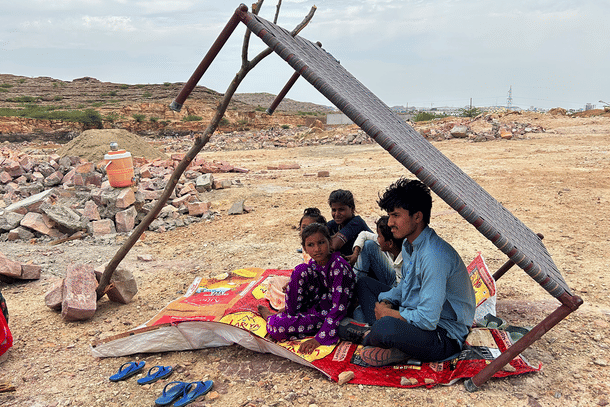
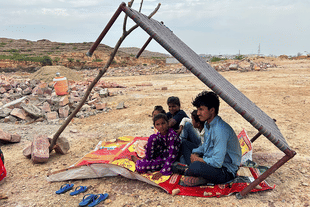
Ramchand Bhil, 23, migrated to India from Pakistan four months ago.
It was a gruelling two-day journey, followed by four more days on the road in various Indian cities, before he reached and settled on the outskirts of Jodhpur in Rajasthan.
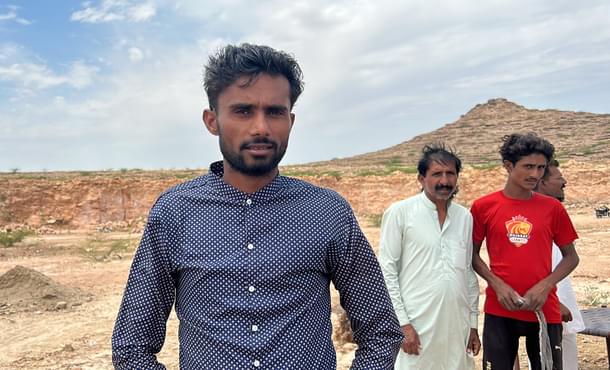
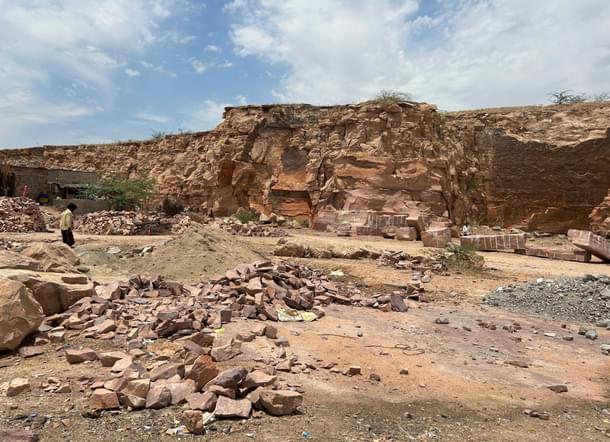
Before permanently leaving his ancestral village in Sanghar district of Sindh province in Pakistan, Ramchand took a four-day pilgrim visa for his family of wife and two children, to visit the holy city of Haridwar in Uttar Pradesh.
The family then boarded a bus to cross the Wagah-Attari border and reach Amritsar city — a journey of more than 900 kilometre.
They spent the night at a Dharmshala run by Durgiana temple, and travelled the next day in bus to reach Haridwar.
After spending the night at another Dharamshala, they boarded a bus to reach Jodhpur in Rajasthan. It took two days.
They stayed with a friend in Chokha Gangana area. With help of activists, they procured a long-term visa (LTV) to stay in India for a couple of years.
Over the next month, Ramchand paid his lifetime savings of 70,000 in Indian currency to a broker from his own Sindhi Bhil community to “buy” a small plot of the arid land. He brought cement, bricks, wooden logs, tarpaulin sheet and ropes from the market, and he and his wife laboured and built a shelter.
For water, which is a scarcity in all of Rajasthan, particularly in the kind of rocky hilly barren land in which Ramchand settled in, the family depended on a concrete cement water storage tank already constructed by earlier migrants.
Last week, officials from the Jodhpur Development Authority (JDA), accompanied by Jodhpur police, arrived at the spot with JCB operators. They demolished about 70 structures including Ramchand’s. The water tank was bulldozed too. Videos of residents screaming and fainting were circulated on social media.
JDA commissioner Navneet Kumar cited encroachment of government land as the reason. He said the drive was to free Sector 2 and Sector 3 of JDA’s residential project in Rajiv Gandhi Colony.
When Swarajya visited the spot on 28 April, four days after the demolition drive, Ramchand was sitting under the shade of a charpoy fixed at about 60 degrees to the ground with help of rocks. That is how the family spent the previous night, which saw strong winds and heavy rains.
“This cot could not do anything. We were completely drenched,” he said.
There was no stove or food in sight at the site of the demolition, where only stones, broken pieces of wooden logs, torn-out tarpaulin sheets and empty utensils lay strewn.
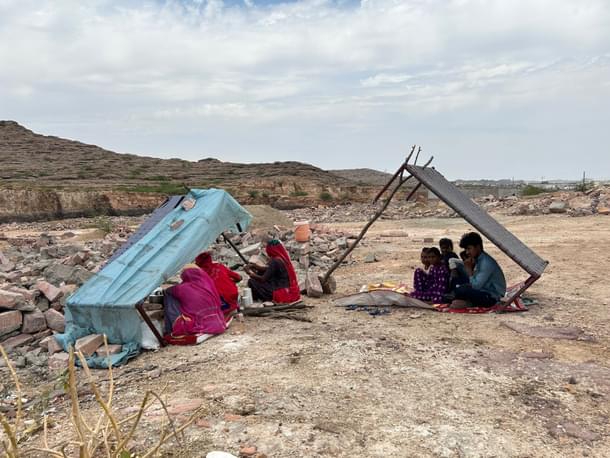
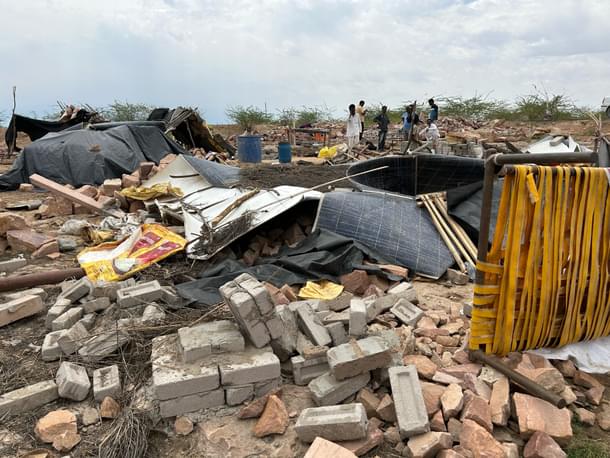
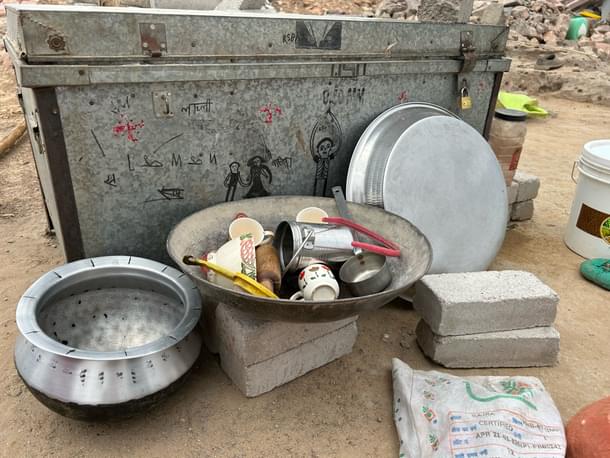
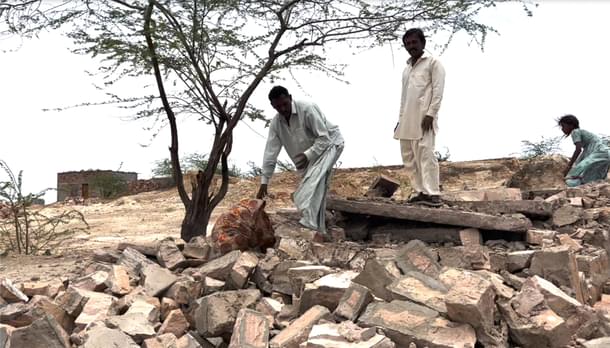
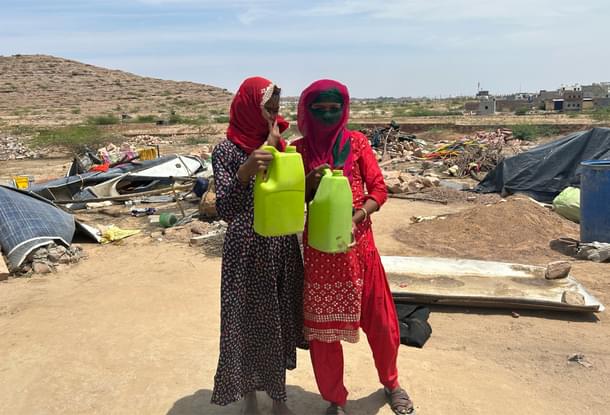
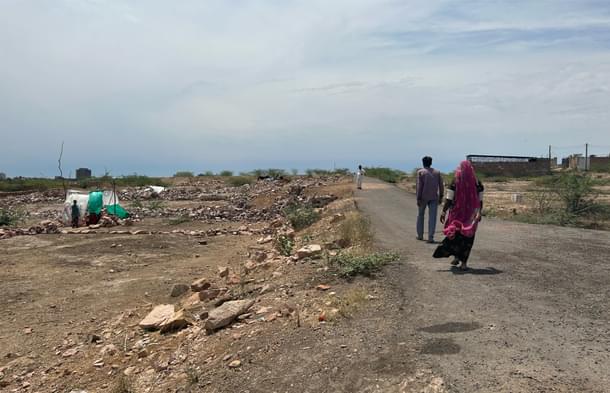
Like Ramchand, several affected families spent the night in the open. Others managed to find shelter at their relatives’ houses who arrived in India much before them, and have better housing and resources.
Ramchand said his children had eaten only one bajra roti each since morning. It was 12pm.
About two dozen people could be seen at the ruins, most of them women, while most of the 500-odd residents of the camp either had gone in nearby areas to rebuild their shelters or were at the police station.
In the morning, a man named Bhag Chand Bhil, considered a community leader among Pakistani migrant Bhils in Gangana, was arrested by the police for instigating residents into attacking JCB operators and a journalist covering the drive on 24 April with stones.
He was accused of interfering in the discharge of public function by government officials.
The residents were visibly angry and said they would agitate on the roads if Bhag Chand was not released in a day. “He helped settle us here. Is that a crime?” said Ramchand.
Commissioner Kumar, on the other hand, told the media that migrants were being fleeced by “some people” with false promises of land ownership in exchange for amounts between Rs 70,000 and 1 lakh.
A day later, two men — Heeralal Bhil and Bhairaram Bhil, both migrants on LTVs — were booked on the charges of illegally selling government land and duping people.
Before his arrest, Bhag Chand Bhil refuted the JDA’s claims in the media and said the land belonged to the mining department and was leased out to private undertakings.
On Thursday (27 April), Commissioner Kumar was removed from his post and put on ‘Awaiting Posting Order’.
Ramchand was as agitated over the loss of Rs 70,000 as over the demolition. “We came from Pakistan with our entire savings and assets. Does the government expect us to bring land from Pakistan as well?” he said bitterly, and narrated another heart-wrenching episode of his struggle.
Ramchand’s house in Pakistan was worth three times of what he was paid by a dealer from the majority community. “Hindus get a raw deal. They know we will give away our land at a pittance,” he said, and added, “Hindus used to be more than Muslims in my village. But out of 500 Hindu families, 300 have already migrated. So prices of Hindu houses have fallen.”
He managed to sell for about 2.5 lakh in Pakistani currency.
The deal was kept a secret from neighbours. The family left the village in dead of the night to avoid attention. “There is constant fear of being looted,” he explained. His money was reduced to 70,000 in Indian currency. He set aside this amount for a house in India, and managed the immediate expenses in the new country by selling off his wife’s jewellery.
Now left with nothing, Ramchand is determined to rebuild his life all over again.
He does not wish to return to Pakistan, which is less than 400 kilometres from where he now lives. Asked the reason, he says, “Our grandparents made a mistake by staying in Pakistan. I won’t repeat the same mistake for my children’s sake”.
Majna Ram Bhil, 60, arrived from Pakistan’s Mirpur Khas district in Sindh to India in 2013. He and his wife Hoori shifted at the behest of their sons, as part of a ‘mota jatha’ (large group) of 400 Hindus who visited India on a pilgrim visa.
He folded his hands and said in an appeal to the authorities to let his children build a house in India. “I and my wife have lived our lives, no matter how good or bad it was. But the [Indian] government should let us live here. Where else do we go?”
In the morning, his sons and daughters-in-law walked 4 kilometre to reach a Bhil basti where older migrants live. They brought bajra rotis, green chillies and a 5-litre can of drinking water.
After eating, the sons went out in search of a suitable spot to erect a shelter for the night while Majna Ram, Hoori, their daughters-in-law and grandchildren waited for them while sitting on the rocks.
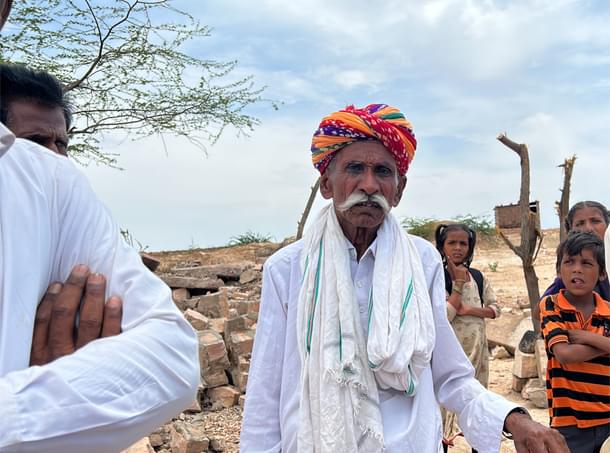
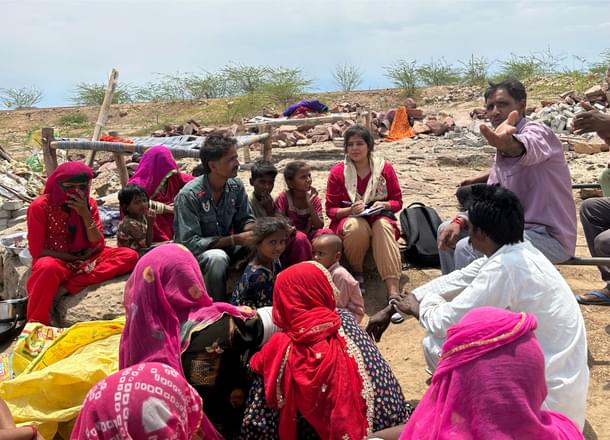
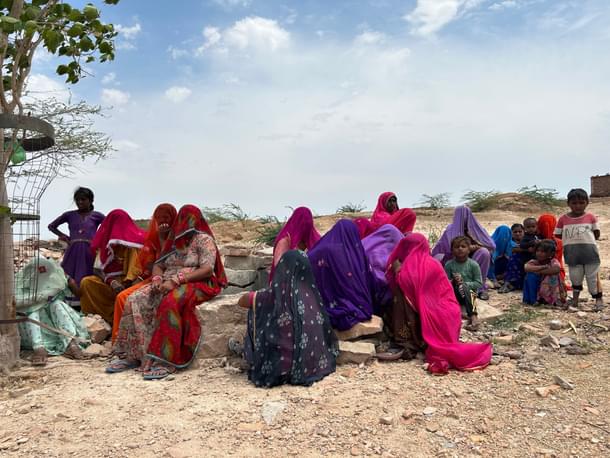
Although the sun is blazing, strong winds are giving some respite to the homeless. About 200 metres away, men are engaged in cementing bamboo poles. Asked if their shelters were broken by the government, a man says, “Yes, they did. Let the government come and destroy this new house as well”.
Women are either resting under the shade of a tree or cooking rotis on a mud oven, a cot fixed over this makeshift kitchen. Some others have gone to the older Bhil basti to get cardboards and wooden planks for a shelter in the night, when stronger winds and heavier rains are expected.
Children say they are waiting to be served their first meal of the day.
Those who have learnt to speak in Hindi (their native language is Sindhi), say they were all born in Pakistan.
Asked if they have any memories of their birthplace, 10-year-old Ganesh, who came to India four months ago, says the children never stepped out of their colony.
“One cannot roam around there in the streets like you are doing. Your bag and phone will be snatched, even your glasses will be taken,” he laughs.
Sat Ram, who is 12 and came to India seven years ago, says his family constantly struggled with poverty and lack of friends in Pakistan. In Jodhpur, the children go to school.
However, they have not attended the school for a week due to demolition. Ganesh says those children who are staying with relatives in the older migrant basti are managing to go to school while others are waiting for their houses to be rebuilt.
I ask if they had enough drinking water. An elder, Chautha Ram, says the children would drink 2 litres each if water was available. Asked if they had taken a shower, he says, “There is no water to drink; how can any of us manage to take a bath?”
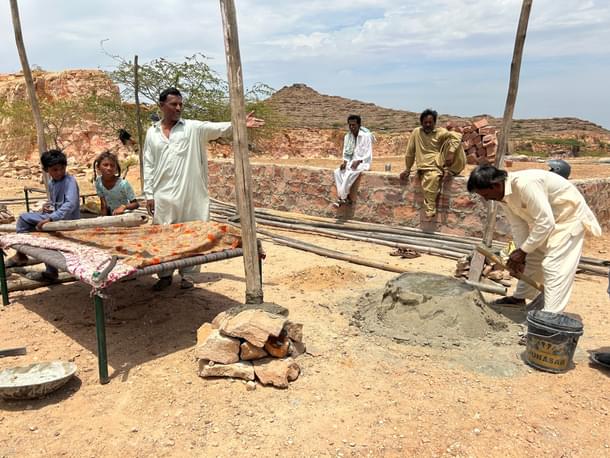
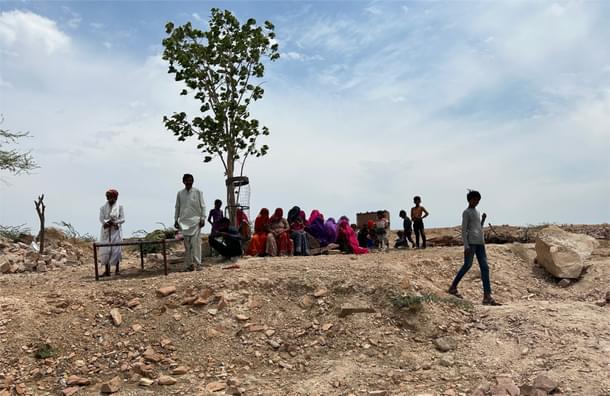
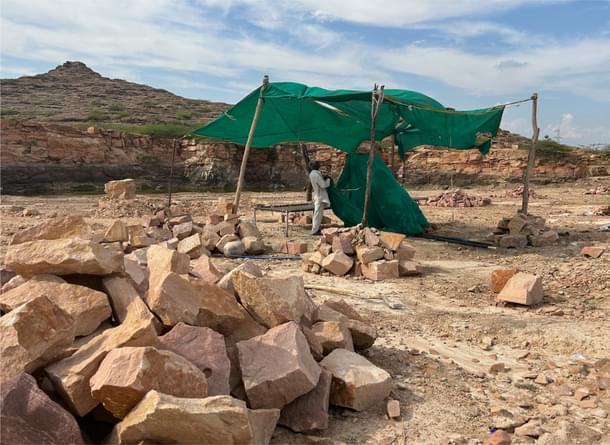
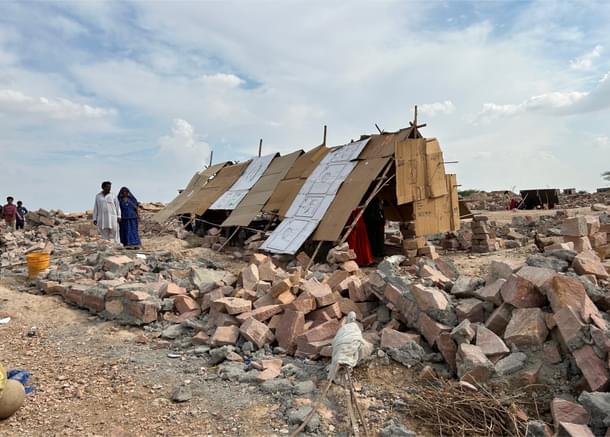
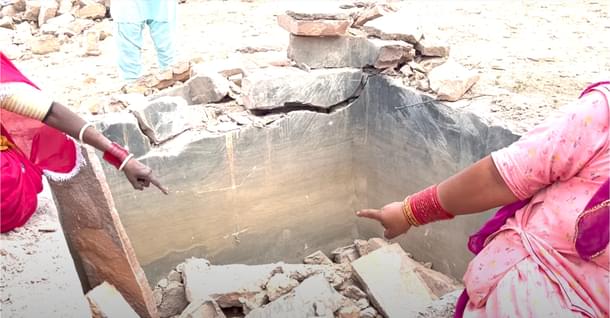
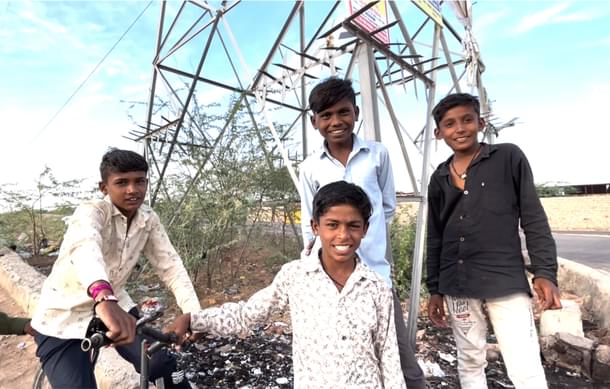
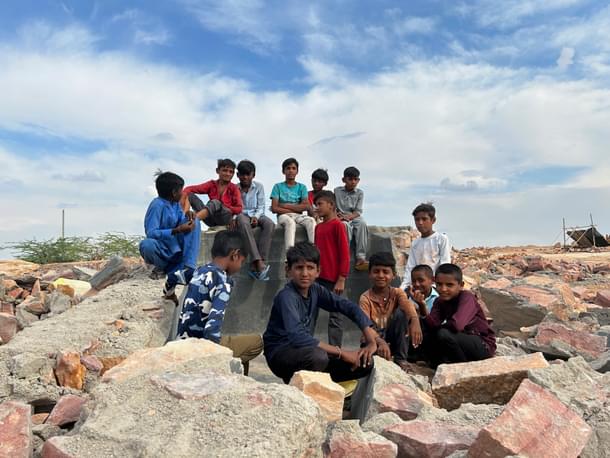
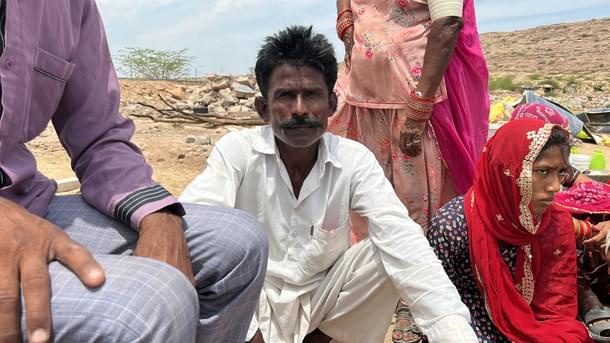
In Chokha Gangana, majority of the pucca houses belong to Muslims while migrant Hindus live in bamboo-tarpaulin shanties. A man named Furqan Khan Silawat from the Muslim community happens to cross the site of the demolition.
On seeing us huddled together and talking, he parks his motorcycle on the side. He says, “We feel for these migrants. Did the Modi government bring CAA bill only to create animosity between the two communities [Hindus and Muslims]? Why has he not given them a place to stay?”
Silawat introduces himself as a member of the minority wing of Congress party in Rajasthan.
When Silawat leaves, the migrants say that several years ago, the Rajasthan government allotted 1,700 plots for Pakistani Hindus in Chokha Gangana.
However, the migrants must have citizenship of India to avail the offer. In the demolished colony, most residents came from 2013 onwards and have not been able to get Indian citizenship so far.
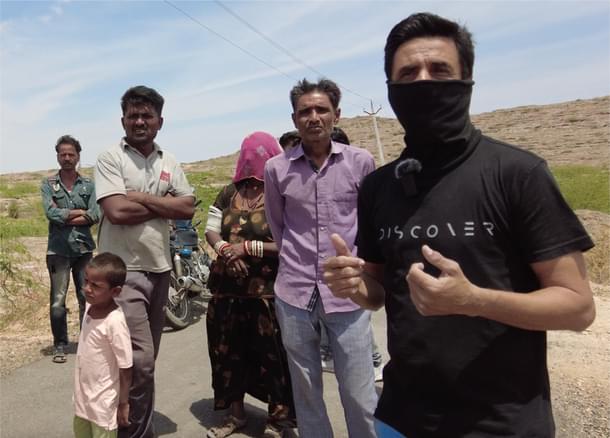
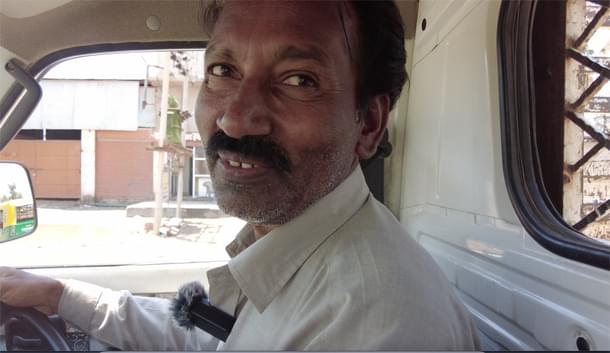
Readers may remember that in a historic move three years ago, Union Home Minister Amit Shah tabled the Citizenship (Amendment) Bill, 2019, in the Lok Sabha, where it passed. Later, it was also approved in the Rajya Sabha.
The bill fast-tracks legal path for citizenship for religious minorities from Pakistan, Afghanistan and Bangladesh. Those who came on or before 31 December 2014 were made eligible for citizenship without wait while those who came in later, could have citizenship after just six years of stay.
The Bill saw violent protests in various Indian states and, in New Delhi, the months-long sit-in agitation staged by the Muslim community culminated in three days of Hindu-Muslim rioting.
The Act has not been implemented yet as the Centre is yet to frame rules. In January, the Centre requested an extension for framing the rules for the seventh time.
Dehraj Bhil, who works as a driver, says he re-applied for citizenship last month. “We keep going to the office and submitting our documents again and again. One day, it will happen and we will have a permanent house,” he says.
Swati Goel Sharma is a senior editor at Swarajya. She tweets at @swati_gs.





